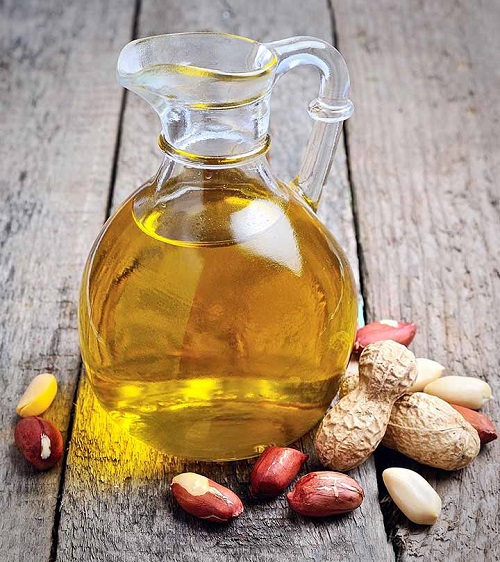Discover the ultimate showdown between Peanut Oil vs. Canola Oil to elevate your culinary adventures and wellness journey!
When it comes to choosing the right oil for your cooking needs, the options can be overwhelming. Two popular choices that often come up in discussions are peanut oil and canola oil. Below, we break down Peanut Oil vs. Canola Oil in terms of production, taste, smoke point, and nutrition to help you make an informed decision.
Get the Best Castor Oil vs. Argan Oil Guide here
What is Peanut Oil?
Peanut oil, derived from the humble peanut, holds a prominent place in the culinary world. Its rich, nutty flavor and high smoke point make it a favored choice for cooking enthusiasts and chefs alike.
Firstly, monounsaturated fats, which are considered heart-healthy and can help lower bad cholesterol levels, predominate in peanut oil. Additionally, it contains polyunsaturated fats, including omega-6 fatty acids, which are essential for our body’s functions. This makes peanut oil a nutritious option among cooking oils.
What is Canola Oil?
Canola oil, a widely used cooking oil, deserves a closer look to truly understand its versatility and health benefits. Derived from the seeds of the canola plant, canola oil is renowned for its low saturated fat content, making it a heart-healthy alternative to many other cooking oils.
To begin with, it is rich in unsaturated fats, particularly monounsaturated fats and polyunsaturated fats, which have been associated with lowering bad cholesterol levels and reducing the risk of heart disease. These qualities make it an excellent choice for health-conscious individuals.
Get the Best Castor Oil vs. Coconut Oil Guide here
Peanut Oil vs. Canola Oil Production
Peanut oil, as the name suggests, is derived from peanuts. These peanuts undergo a meticulous process involving roasting, crushing, and pressing to extract the oil. This method preserves the distinct flavor and aroma of peanuts, making it a quintessential choice for dishes where a nutty undertone is desired.
Canola oil, on the other hand, is produced from the seeds of the canola plant, a variety of rapeseed. The seeds undergo crushing and pressing to release the oil. Subsequently, the oil is refined to create a product with a neutral flavor profile and an exceptionally high smoke point.
Learn about Seasoning Cast Iron with Grapeseed Oil here
Peanut Oil vs. Canola Oil Smoke Point
In terms of the smoke point, peanut oil excels. It boasts a high smoke point of about 450 F, making it ideal for various high-heat cooking methods such as frying, deep frying, and stir-frying. This attribute means peanut oil can withstand the higher temperatures required for these techniques without breaking down and producing smoke.
Conversely, canola oil also offers an impressive smoke point of around 428 F. With its high smoke point, canola oil is well-suited for frying, sautéing, grilling, and roasting. This characteristic allows it to maintain its integrity at elevated cooking temperatures without generating smoke or developing undesirable tastes.
Learn about Seasoning Cast Iron with Coconut Oil here
Peanut Oil vs. Canola Oil Taste
In terms of taste, peanut oil offers a distinct advantage. Peanut oil derives from peanuts and imparts a rich, nutty flavor to dishes. This unique and flavorful profile enhances the taste of foods, adding a layer of complexity and depth that is particularly cherished in Asian and Southern cuisines. When you use peanut oil for cooking, you can expect your dishes to carry a delightful nutty undertone that elevates the overall flavor.
Canola oil offers a more subdued flavor, allowing the natural taste of your ingredients to take center stage. Its neutral profile makes it a versatile option suitable for various cooking methods and recipes.
Peanut Oil vs. Canola Oil Nutrition
Peanut oil is rich in monounsaturated fats, which are known to improve cardiovascular health. It also contains vitamin E and phytosterols, which have antioxidant and cholesterol-lowering properties, respectively.
In the realm of nutrition, canola oil shines for its low saturated fat content and high levels of omega-3 fatty acids. These attributes contribute to its heart-healthy reputation. Moreover, canola oil is rich in vitamins K and E, offering a well-rounded nutritional profile.
Learn about Seasoning Cast Iron with Avocado Oil here
Peanut Oil vs. Canola Oil for Cooking
Boasting a high smoke point, peanut oil is well-suited for high-heat cooking methods such as frying, deep frying, and stir-frying. Its distinctive peanut flavor adds a layer of complexity to dishes, making it a favorite choice in Asian and Southern cuisines.
Canola oil shares the advantage of a high smoke point with peanut oil, rendering it versatile for frying, sautéing, grilling, and roasting. Plus, its neutral flavor profile allows the natural taste of ingredients to shine through, making it adaptable to a wide range of culinary applications.
Peanut Oil vs. Canola Oil for Frying
For frying applications, peanut oil often comes out ahead due to its robust flavor and high smoke point. The oil remains stable at the high temperatures often required for deep frying and pan frying, resulting in less smoke and a cleaner taste. Its distinct nutty aroma adds an extra layer of flavor to fried foods, offering a gastronomic experience that is rich and complex.
Canola oil doesn’t lag behind when it comes to frying, either. Its high smoke point ensures that it can handle the rigors of deep frying, shallow frying, or pan frying without breaking down. Its neutral flavor profile offers a clean backdrop, allowing the primary ingredients to shine.
Select the Best Oil for Seasoning Cast Iron in this Guide
Peanut Oil vs. Canola Oil for Deep Frying
Peanut oil offers an elevated culinary experience when it comes to deep frying. Thanks to its high smoke point, it remains stable under the intense heat conditions of deep frying, minimizing smoke and undesirable flavors. Its nutty profile adds a nuanced taste dimension, making fried foods more intriguing to the palate.
Canola oil is also a top pick for deep frying. Its high smoke point ensures it remains stable under high-heat conditions, and its neutral taste doesn’t interfere with the flavor of the food. This makes it a versatile choice for those who prefer their deep-fried foods to have a cleaner, more neutral taste.
Learn about Seasoning Cast Iron with Canola Oil here
Peanut Oil vs. Canola Oil for Constipation
Peanut oil is a good source of monounsaturated fats and can be beneficial for those dealing with constipation. The oil’s natural lubricating properties can facilitate smoother bowel movements. It is also rich in vitamin E, which contributes antioxidant benefits and may promote gut health.
Derived from canola seeds, this oil is rich in omega-3 fatty acids, known for their anti-inflammatory properties that can foster a healthy gut environment. It is also low in saturated fat, making it a heart-friendly option. Its nutritional composition may assist in managing constipation, particularly when it forms part of a broader dietary and health strategy.
Get the Best Castor Oil vs. Olive Oil Guide here
Final Verdict
Both Peanut and Canola Oil offer distinct advantages in the kitchen and potentially in health management, such as aiding digestion. Peanut oil excels in high-heat cooking and frying, bringing a unique nutty flavor that enhances the complexity of dishes. It may also offer digestive benefits due to its monounsaturated fat content.
Canola oil also performs well under high-heat conditions and is favored for its neutral flavor profile, making it versatile across various cooking styles. Its omega-3 fatty acid content can offer anti-inflammatory benefits, potentially aiding in digestion and heart health.
In summary, your choice between Canola and Peanut Oil should hinge on the specific culinary application and health considerations. Both oils have their merits, and either could be a valuable addition to your kitchen and wellness routine.
FAQs
-
What Are The Key Differences Between Peanut Oil and Canola Oil?
Peanut Oil and Canola Oil differ in terms of their sources, flavor profiles, smoke points, and nutritional compositions. Peanut oil, deriving from peanuts, imparts a distinct nutty flavor, while Canola oil, made from rapeseed, possesses a neutral taste. Peanut oil, with its higher smoke point, proves suitable for high-heat cooking, whereas Canola oil earns renown for its heart-healthy omega-3 fatty acids.
-
Which Oil Is More Sustainable For The Environment?
When it comes to sustainability, Canola Oil often takes the lead. Canola plants require less water and land compared to peanut cultivation. Additionally, the production of Canola Oil generates fewer greenhouse gas emissions. However, the environmental impact can vary depending on farming practices and geographical location.
-
Are There Any Health Differences Between Peanut Oil and Canola Oil?
Both oils offer health benefits but in different ways. Peanut Oil is rich in monounsaturated fats and vitamin E, which may support heart health and provide antioxidant benefits. Canola Oil, on the other hand, is low in saturated fats and contains omega-3 fatty acids, moreover which can help reduce the risk of cardiovascular diseases.
-
Which Oil Is Better For Deep Frying?
Peanut Oil is a popular choice for deep frying due to its high smoke point, which means it can handle the high temperatures required for frying without breaking down and producing harmful compounds. Canola Oil, moreover while still suitable for frying, has a slightly lower smoke point.
-
Which Oil Is More Versatile In Cooking?
Canola Oil’s neutral flavor makes it a versatile option for use in a wide range of dishes, including sautéing, baking, and salad dressings, without overpowering the taste of the food. Peanut Oil, with its distinct nutty flavor, additionally finds its best use in dishes where its taste complements the ingredients, such as Asian stir-fries.
-
Are There Any Allergy Concerns With Peanut Oil?
Individuals with peanut allergies should exercise caution with Peanut Oil. While highly refined Peanut Oil is unlikely to contain allergenic proteins, it’s advisable to consult with a healthcare professional if there are concerns. Furthermore, people with nut allergies generally consider canola oil a safer option.











